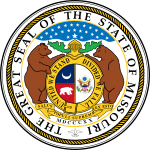| |||||||||||||||||
| |||||||||||||||||
 County results Marmaduke: 40–50% 50–60% 60–70% 70–80% 80–90% Ford: 40–50% 50-60% 60-70% 70-80% 80-90% | |||||||||||||||||
| |||||||||||||||||
| Elections in Missouri |
|---|
 |
The 1884 Missouri gubernatorial election was held on November 4, 1884, and resulted in a victory for the Democratic nominee, former Confederate general John S. Marmaduke, over the Republican candidate, former Congressman David Patterson Dyer, and Populist nominee John A. Brooks.
Marmaduke died in 1887 and was replaced for the remainder of this term by Lt. Gov. Albert P. Morehouse. [1]

